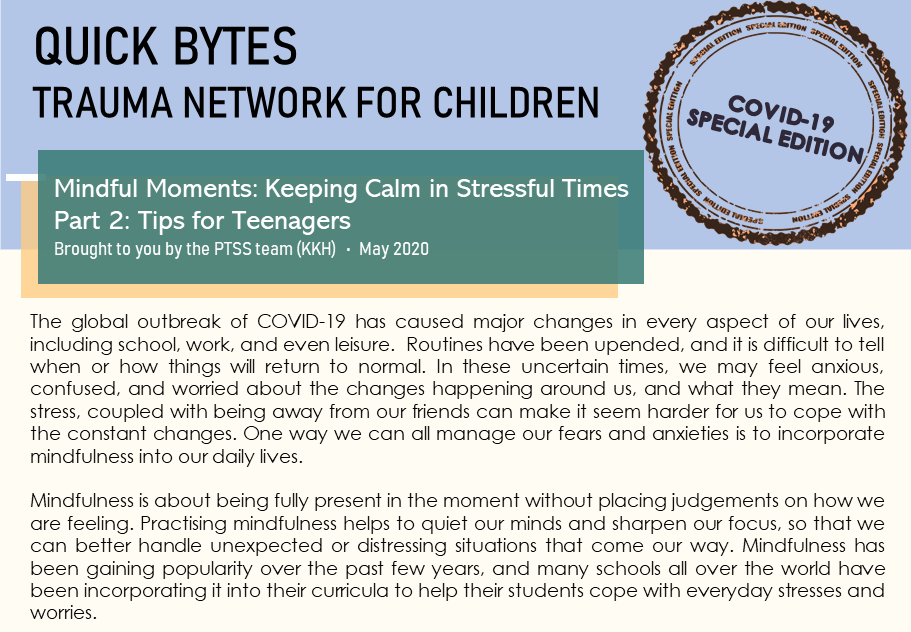HealthXchange will NEVER ask you to transfer money over a call. If in doubt, call the 24/7 ScamShield helpline at 1799, or visit the ScamShield website at www.scamshield.gov.sg.
Resources

Click on the following videos to learn more about how crisis and trauma may affect children.
Introduction to Crisis
Impact of Trauma on the Brain
How Do Children Of Different Ages Respond To Crisis?
The Impact of Toxic Stress on Children
To access a free online trauma screen, please fill in the Child Trauma Screening Questionnaire (CTSQ) that can be found here.
The Child Trauma Screening Questionnaire (CTSQ) was developed by Dr Justin Kenardy and his colleagues, and it is intended for use by children aged 7 to 16 years.
Please note that the CTSQ is NOT a diagnostic tool. If you have any concerns about yourself or your loved ones, please seek professional support.
This is a non-exhaustive list of services accurate as of 8/12/2025. Please contact the respective organisations directly for more updated information and details.
Find appropriate support near you: mindline.sg | Free Mental Health Resources & Mindfulness Tools in Singapore
The following platforms offer 24/7 support:
| Platform | Contact | Who It's For |
|---|---|---|
| National mindline |
|
Safe, stigma-free mental health support for those in need |
| Samaritans of Singapore (SOS) |
|
Emotional support for anyone experiencing crises and/or has thoughts about suicide |
If you or someone you care for is experiencing mental health concerns, support is available. We encourage children and youth to speak to their school counsellor, or professionals from the family service centre located closest to home.
You can also reach out to the organisations listed below, which have counsellors, social workers, and psychologists experienced in helping children and youth in distress, and their families. Some also offer trauma‑trained therapists.
1. If you are facing any mental health issues and would like advice, you may consider reaching out to the following:
| Organisation | Operating Hours | Services/ Who It's For |
|---|---|---|
| CHAT (Community Health Assessment Team) | Tuesday to Saturday, 12PM to 9PM (excluding public holidays) | Personalized and confidential mental health assessments for youths aged 16 - 30 years old. |
| Youth Community Outreach Team (CREST-Youth) | Operating hours may vary – please contact the organisations directly | For youths aged 12 - 25 years old who are at risk of mental health conditions, and their families. |
| Youth Integrated Teams (YIT) | Operating hours may vary – please contact the organisations directly | For youths aged 12 - 25 years old who are at higher risk for mental health conditions, their families and their support systems. |
2. If you are aware of your needs and are seeking intervention, you may consider reaching out to the following:
| Organisation | Operating Hours | Services |
|---|---|---|
| Allkin Psychological Services Unit |
|
|
| Counselling and Care Centre (CCC) |
|
|
| Epworth Community Services | Please contact the organisation directly for details |
|
| Impart | Please contact the organisation directly for details |
|
| SHINE Individual and Family Therapy (SH.IFT) | Please contact the organisation directly for details |
|
| Melrose Care |
|
|
| Morning Star Counselling Therapy | Please contact the organisation directly for details |
|
| Platform | Operating Hours | Services/ Who It's For |
|---|---|---|
| eC2.sg QuickChat by Fei Yue Community Services |
|
|
|
|
|
| Oogachaga WhatsApp Counselling |
|
|
| Over-The-Rainbow (OTR Listens) |
|
|
| Tinkle Friend Online Chat |
|
|
| Platform | Contact | Operating Hours | Services/ Who It's For |
|---|---|---|---|
| Care Corner (Mandarin-speaking) | Call: 1800-3535-800 | Monday - Sunday: 10AM to 10PM (excluding public holidays) | Support for individuals who need emotional first aid and counselling |
| Singapore Association for Mental Health (SAMH) | Call: 1800-283-7019 | Monday - Friday: 9AM to 6PM (excluding public holidays) | Help and counselling for people with mental health concerns and their families |
| Tinkle Friend | Call: 1800-2744-788 | Monday - Friday: 2.30PM to 5PM (excluding public holidays) | Emotional support for children aged 13 years old and below |
| TOUCHline | Call: 1800-377-2252 | Monday - Friday, 9AM to 6PM (excluding public holidays) | Support for anyone struggling with mental health concerns |
- Family Service Centres (FSCs) are community-based social services that serve low-income and/or vulnerable individuals and families who need social and emotional support.
- Locate your nearest FSC here.
- To be seen by psychologists at restructured hospitals, a referral must be made by a medical doctor within the hospital: this does mean that you will be seen by at least two professionals within the hospital setting.
- To obtain subsidised rates, it would be best to obtain a referral from the GP at the polyclinic.
- If there is a medical emergency, please head to the A&E department of your nearest hospital.
Quick Bytes is our monthly newsletter that brings you byte-sized information about trauma. Click on the issues below to find out more!
Latest Issues
Past Issues
Quick Bytes Issue 65 - Encouraging Safe Media Usage in Children and Teenagers
Quick Bytes Issue 64 - Taking Care of Yourself- Managing Trauma-related Stress Conditions
Quick Bytes Issue 63 - Managing Unhealthy Sexual Behaviours in Children and Adolescents (Part 2)
Quick Bytes Issue 62 - Understanding Sexual Behaviours in Children (Part 1)
Quick Bytes Issue 61 - Creating Supportive Environments for Children, Youth, and Families
Quick Bytes Issue 60 - Trauma Responsive Parenting
Quick Bytes Issue 59 - Perinatal Trauma
Quick Bytes Issue 58 - Supporting Grief and Loss in Young Children
Quick Bytes Issue 57 - TNC Website Updates – Refreshed, Revamped, Reorganised
Quick Bytes Issue 56 - Introducing Our Preschool Storybook!
Quick Bytes Issue 55 - Using Creative Art to Facilitate Trauma Narrative and Processing
Quick Bytes Issue 53 - Supporting Post Traumatic Growth in Children
Quick Bytes Issue 52 - Supportive Listening: How to Respond to a Child after a Crisis
Quick Bytes Issue 51 - Post Intensive Care Syndrome in Paediatrics (PICS-p)
Quick Bytes Issue 50 - Polyvagal Theory - Part 3
Quick Bytes Issue 49 - Polyvagal Theory - Part 2
Quick Bytes Issue 48 - Polyvagal Theory - Part 1
Quick Bytes Issue 47 - Resources for Telehealth with Children and Youth
Quick Bytes Issue 46 - Effects of Child Maltreatment on the Developing Brain
Quick Bytes Issue 45 - No Time for Self-Care (I AM Worth It!)
Quick Bytes Issue 44 - 5 Tips For Talking to Children about Money during the Pandemic
Quick Bytes Issue 43 - Co-regulation
Quick Bytes Issue 42 - Trauma Network for Children Website Launch
Quick Bytes Issue 41 - Art and Music Therapy for Children with Trauma
Quick Bytes Issue 40 - Trauma in Children with Special Needs
Quick Bytes Issue 39 - Covid-19 Special Edition
Adjusting to the New Normal
Quick Bytes Issue 31 - Highlights and Future Directions of the Trauma Network for Children
Quick Bytes Issue 30 - Trauma and Recovery (Book Review)
Quick Bytes Issue 29 - Trauma in Children 6 Years and Below (Part 2)
Quick Bytes Issue 28 - Trauma in Children 6 Years and Below (Part 1)
Quick Bytes Issue 27 - Parenting Support for Caregivers of Children Affected by Trauma
Quick Bytes Issue 26 - Trauma and the Brain
Quick Bytes Issue 25 - Compassion as an Antidote to Shame (Part 3)
Quick Bytes Issue 24 - Impact of Shame (Part 2)
Quick Bytes Issue 23 - How Trauma Causes Shame (Part 1)
Quick Bytes Issue 22 - Child Trauma Conference
Quick Bytes Issue 21 - Creative Ways to Teach Emotional Identification Skills
Quick Bytes Issue 20 - Dance/Movement Therapy
Quick Bytes Issue 19 - The Importance of Engaging the Body in Trauma Therapy
The global coronavirus health crisis is a stressful time for everyone in Singapore and around the world. Everyone responds to stress differently—our children and teenagers are no exception. They may have many mixed feelings about the coronavirus and rapidly changing measures implemented by our government to keep everyone safe and our nation as healthy as possible.
Some children and teenagers may have a positive or neutral response to the changes in the home or school as a result of the Circuit Breaker and other implemented measures during this COVID-19 period, while others may not. These changes can be confusing or frustrating for children and teenagers.
Other feelings children and teenagers may experience are:
Moodiness or irritability because they are unable to play or hang out with their friends or see their extended family like they used to
Disappointment over cancelations of various social, entertainment and school events such as concerts, sports, internship placements, performances
Relief or worries about school examinations being affected, particularly for those who are to sit for the major examinations such as, PSLE, GCE 'O' and 'A' Levels
Fears and worries that their loved ones, or themselves, may fall ill or catch the coronavirus
Feelings of overwhelm by the continuous coverage of COVID-19 in the media
Being affected and disturbed by the stress or distress that you might be feeling
Children and teenagers can cope better with social support, when key adult figures in their lives talk to them and clarify their worries with accurate, updated and age-appropriate information about the coronavirus and the measures being taken in Singapore (i.e., social distancing of 1.5m to 2m, "Circuit Breaker", home-based learning). They may also adjust better to these changes with your help and support.
The following articles are part of our special edition Quick Bytes newsletters during this COVID-19 situation.
Get the Health Buddy App
© 2025 SingHealth Group. All Rights Reserved.






























 Get it on Google Play
Get it on Google Play